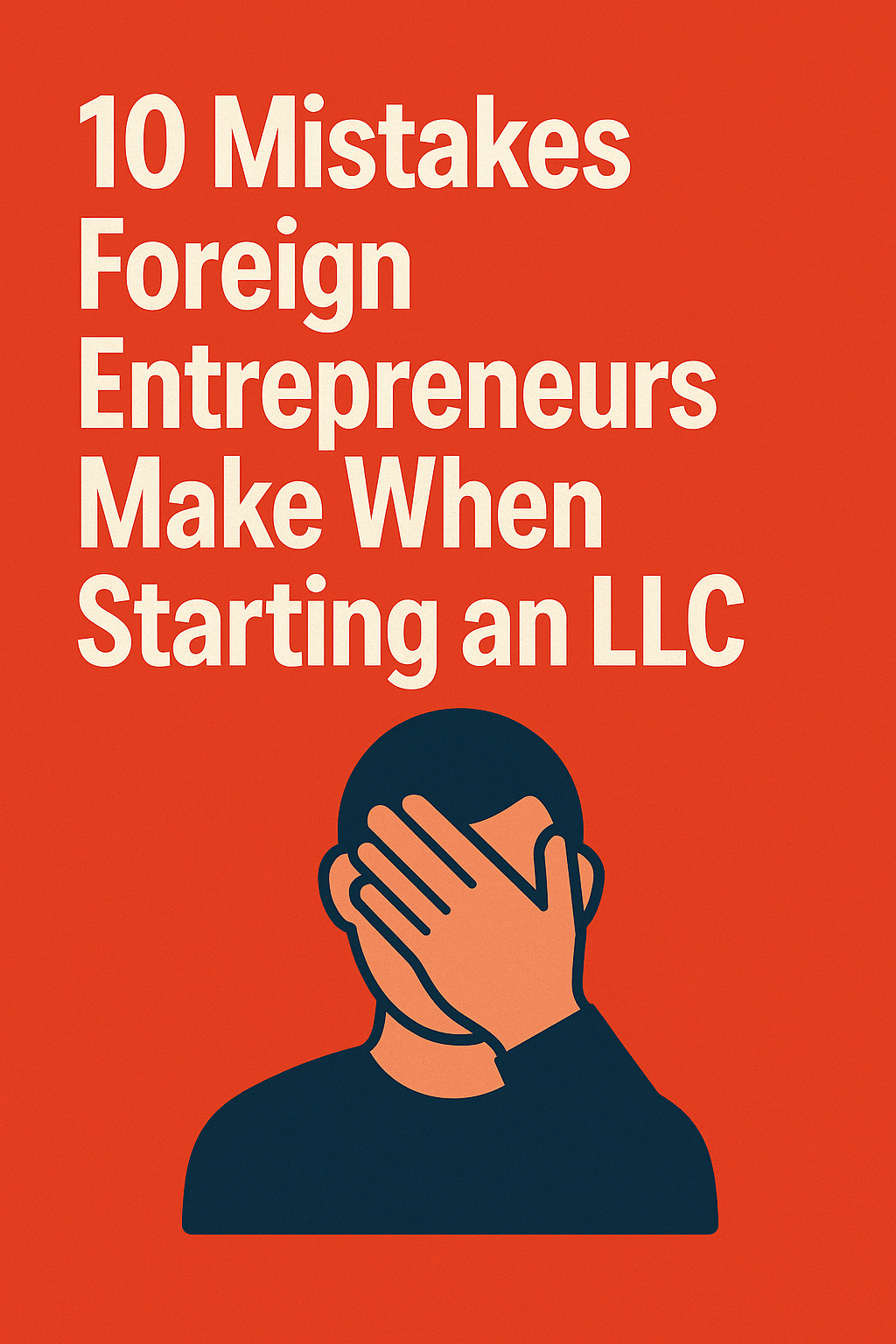
10 Mistakes Foreign Entrepreneurs Make When Starting an LLC
Paylaşmak
Forming a U.S. Limited Liability Company (LLC) can open the door to new markets, investors, and global credibility. But for many foreign entrepreneurs, the process is full of traps. Small mistakes can lead to tax problems, frozen bank accounts, or even the loss of your business credibility.
Here are the 10 most common mistakes international founders make when starting an LLC in the United States and how to avoid them.
1. Choosing the Wrong State For LLC
Not all states are equal. While Delaware and Wyoming are popular for their business-friendly laws, many entrepreneurs mistakenly form their LLC in a random state.
If you don’t plan to operate physically in that state, you could face double registration fees and extra taxes.
Tip: Pick Delaware for startups seeking investment or Wyoming for small businesses and digital nomads.
2. Not Hiring a Registered Agent
U.S. law requires every LLC to have a registered agent with a physical U.S. address.
Many foreign founders skip this step or choose unreliable providers, risking missed legal notices.
Tip: Always use a reputable registered agent service. It’s a small annual fee that protects you legally.
3. Ignoring the Operating Agreement
Even if not required in every state, the Operating Agreement defines ownership, roles, and profit distribution.
Skipping it creates confusion among co-founders and weakens legal protection.
Tip: Draft a clear Operating Agreement—even if you’re the sole owner.
4. Using a Personal Address for Business
Some founders use their home or friend’s address in the U.S.
This can cause credibility issues with banks and investors.
Tip: Use your registered agent’s address or a proper virtual office service to maintain professionalism.
5. Misunderstanding EIN vs ITIN
- EIN (Employer Identification Number): Needed for taxes and banking.
- ITIN (Individual Taxpayer Identification Number): For individuals without SSN.
Foreign entrepreneurs often confuse the two, leading to delays in opening bank accounts.
Tip: Always apply for an EIN first for your LLC, and get an ITIN if you personally need to file taxes.
6. Failing to Open a U.S. Bank Account
Without a U.S. business bank account, you can’t properly separate personal and business finances.
Some founders rely on PayPal or personal accounts → this leads to compliance problems.
Tip: Use services like Mercury or Brex if you can’t travel, or open an account in-person at Chase or Bank of America.
7. Overlooking Tax Obligations
Many foreign LLC owners assume “no U.S. presence = no taxes.”
In reality, if your LLC earns U.S. source income, you must file federal tax forms—even if your liability is $0.
Tip: File the correct forms (e.g., Form 5472, 1120) every year to stay compliant.
8. Forgetting Annual Reports and Fees
Each state requires annual franchise taxes or reports.
Foreign entrepreneurs often forget, and their LLC is dissolved.
Tip: Set yearly reminders for Delaware ($300 flat fee) or Wyoming (~$60–100).
9. Mixing Personal and Business Finances
If you use your LLC funds for personal expenses, courts may “pierce the corporate veil,” removing your liability protection.
Tip: Always keep business and personal finances separate. Use dedicated accounts and bookkeeping.
10. Not Seeking Professional Advice
Trying to DIY everything to save money often backfires.
A wrong filing or missed tax form can cost thousands later.
Tip: Consult professionals (lawyers, accountants, or business formation experts) for at least the first setup.
Conclusion
Starting a U.S. LLC as a foreign entrepreneur is an exciting step, but avoiding these 10 mistakes is crucial.
With the right structure, compliance, and planning, your LLC can be a powerful gateway to global growth.
Don’t let small mistakes undermine your big ambitions.
